Search the Special Collections and Archives Portal
Search Results

Gene Noboru Nakanishi oral history interview: transcript
Date
Archival Collection
Description
Oral history interview with Gene Noboru Nakanishi conducted by Ayrton Yamaguchi, Cecilia Winchell, and Stefani Evans on April 2, 2021 for Reflections: The Las Vegas Asian American and Pacific Islander Oral History Project. Gene Nakanishi shares his detailed family history from both his father's and his mother's families. He discusses his paternal grandfather's work on the Union Pacific Railroad, the family's internment in Wyoming during World War II, and his father's release from the camp by joining the United States Army Signal Corps. Nakanishi also talks of his maternal grandfather who was of the Bushido ("warrior") class in Osaka, Japan, and his grandfather's work with Christian missionaries. He shares details of his mother's restaurant employment in Los Angeles and her opening of Osaka Japanese Bistro in Las Vegas in 1969. Nakanishi also talks about being born and raised in Las Vegas, his musical schooling at Berklee College of Music in Boston, and his graduate education at Harvard University. He discusses his work as a band teacher for the Clark County School District, his involvement in the Idyllwild Arts Summer Program band camp, and his interests in jazz music.
Text
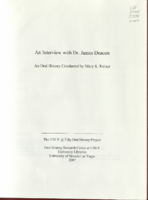
Transcript of interview with Dr. James Deacon by Mary K. Keiser, August 24, 2006
Date
Archival Collection
Description
Text
Evelyn Stuckey Papers
Identifier
Abstract
The Evelyn Stuckey Papers date from 1940 to 1972 and document Stuckey's experience as a physical education teacher at Las Vegas High School (LVHS) in Las Vegas, Nevada and founder of the LVHS Rhythmettes dance group. The collection contains personal and educational materials from Stuckey’s college years, personal correspondence, and photographs. It also contains materials documenting the Rhythmettes' activities including travel plans, posters and fliers, news clippings, and group rosters.
Archival Collection
Kathleen Kinley oral history interview
Identifier
Abstract
Oral history interview with Kathleen Kinley conducted by Jamie Quashnock on December 13, 2007 for the Public School Principalship Oral History Project. In this interview, Kinley reflects upon her 34-year career in education, with 14 years as a teacher and 20 years as an administrator in the Clark County School District. She discusses her job duties as teacher, assistant principal, principal, and assistant superintendent, and how the positions compare with each other. She also discusses the importance of self-care and leisure time as a balance to the demanding workload.
Archival Collection
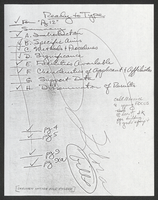
University of Nevada, Las Vegas law school establishment: correspondence
Date
Archival Collection
Description
Folder from the Flora Dungan Papers (MS-00193) -- Series 4. University of Nevada Regents Material.
Text

Transcript of interview with Patricia Carmichael Craddock by Joe Schneider, March 2, 1980
Date
Archival Collection
Description
Text
Sarah McKenzie oral history interview
Identifier
Abstract
Oral history interview with Sarah McKenzie conducted by Brandy Campbell on October 22, 2002 for the Public School Principalship Oral History Project. In this interview, McKenzie reflects upon her career as a middle school, high school, and special education administrator in Fort Worth, Texas. She describes the process by which she initially became a teacher, and later an administrator. She discusses her experiences working in special education, and describes her typical responsibilities and challenges.
Archival Collection
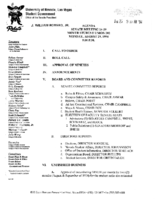
Meeting minutes for Consolidated Student Senate University of Nevada, Las Vegas, August 29, 1994
Date
Archival Collection
Description
Text
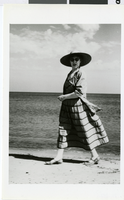
Photograph of Ann E. Brewington, 1920s-1930s
Date
Archival Collection
Description
Image
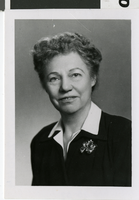
Photograph of Ann E. Brewington, 1954
Date
Archival Collection
Description
Image
